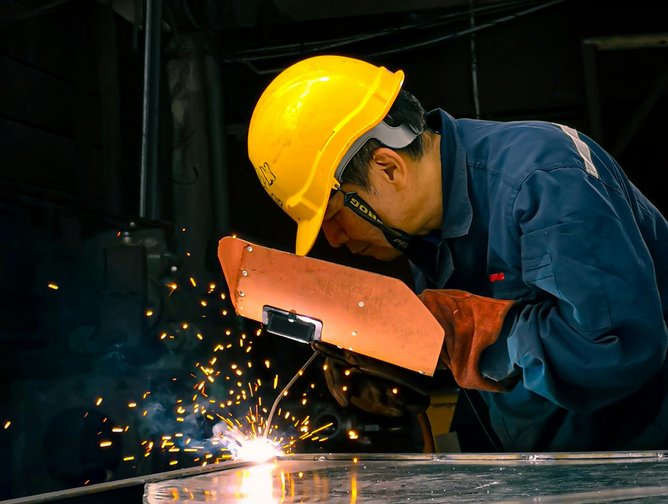PwC: Here’s how Manufacturers can Effectively Implement AI

Artificial intelligence, like other technologies fuelling digital transformation, is more than a means to address pre existing challenges in the sector, like supply chain bottlenecks, high production costs and equipment failure.
AI is a technological catalyst for long term business transformation, that to be implemented successfully, requires fundamental changes to how manufacturers structure their business, operations and internal culture. These changes are worth it, considering the potential results.
“For manufacturers, AI promises to be a game-changer at every level of the value chain.” said Badr Al-Olama, Head of the Global Manufacturing and Industrialisation Summit (GMIS).
“Direct automation, predictive maintenance, reduced downtime, 24/7 production, improved safety, lower operational costs, greater efficiency, quality control and faster decision making are just some of the rewards on offer to organisations that embrace the transformation and master the implementation of AI throughout their entire business.”
Badr Al-Olama here is contributing his insights to PwC’s whitepaper An Introduction To Implementing AI In Manufacturing. This whitepaper gives manufacturers a critical framework for strategic AI implementation throughout the value chain. The whitepaper establishes six building blocks for successfully enhancing manufacturing production, engineering and testing through AI, and sorts manufacturers into four key categories according to their digital maturity.
Digital novices
Companies which employ siloed digital applications and solutions in a functional or departmental level. Digital novices continue to rely on legacy systems and haven’t progressed to strategically implementing emerging technologies.
Digital followers
Digital followers, as the name implies, follow in the footsteps of more digitally agile manufacturers. Their internal functions including sourcing, engineering, sales and marketing collaborate closely, but there’s little integration beyond this.
These manufacturers lack a digitally oriented workforce and culture, and tend to adopt emerging technologies as part of observing and following the greater results they’ve provided other companies.
This approach lacks strategic consideration, the understanding that all technological implementation should be designed around serving the businesses specific needs.
Digital innovators
Digital innovators have integrated platforms that enhance their digital connections to customers and external partners. This horizontal digitisation however – which focuses on collaboration and information exchange – limits them to the immediate supply chain.
Digital innovators prioritise and pursue the newest means of digital transformation, but their advances are limited in scope. They have not digitised their wider ecosystem, and are missing out on the benefits of using technology to bring customer solutions and people together.
Digital champions
Digital champions are manufacturers who have strategically identified and implemented digital solutions across their operations to serve business needs and enhance the connectivity of their value chain. These companies have worked to create a digital culture, investing in sourcing, training and the skills of their workforce.
These manufacturers implement technologies like AI across operations, using the technology to offer multilevel customer interactions and tailored solutions. Digital transformation is not treated as a siloed issue or an emerging project but a business imperative, to remain competitive, productive and efficient as economic demand shifts from products to software.
A clear example of a digital champion is FANUC, one of the largest manufacturers of industrial robots in the world. The whitepaper explores how the manufacturer exemplifies an AI-led future, developing robots capable of building, inspecting and testing themselves. With 22 advanced sub-factories, FANUC’s approach to artificial intelligence embodies effective AI implementation.
Through machine learning it is proactively addressing future problems of downtime and maintenance, creating a self-sustaining workforce that can truly fulfil the automation dream of continuous operations.
In order to help manufacturers become digital champions, the whitepaper establishes six key building blocks to effective AI implementation. Here, manufacturers can gain critical insight into what effective implementation will take, and what they will need to do to shift their position on the digital maturity spectrum.
The six building blocks
06: Business applications
The whitepaper argues that the starting point of any manufacturer’s AI strategy has to be essential business applications. Manufacturers must question what role AI will play in their current and long term business strategy, gathering use cases across operations to accurately assess their success. This will require use cases to be grouped together based on function, business outcomes and the effort they took to implement.
This helps to identify what the whitepaper terms ‘lighthouse’ use cases, early and high-profile cases that can help the company to forge an impactful AI path. By establishing a vision and use cases to back it up, manufacturers will be able to drive AI adoption across operations and streamline organisational and technological requirements.
A case study the whitepaper presents of AI implementation is 3B Fibreglass (3B) a supplier and developer of glass-fibre technologies and products to reinforce thermoset polymers and thermoplastics. Ai provided superior visibility into the company’s Fibreglass manufacturing process, helping them diagnose common causes behind breakages. By elevating their overall efficiency through data, the business necessity of AI at 3B was clear.
“To create value with AI, 3B is not only aiming for the low-hanging fruit, but also the problems with larger value potential.” said Dimitri Laurent, Global Operations Director and Glass Science and Technology leader at 3B.
“Addressing these helps to convince leaders about the value of AI.”

05: Data
Data is essential to manufacturing operations. It’s also essential to the successful implementation of AI. Applying AI algorithms to the manufacturers processes and receiving useful insights is dependent upon effective data management, governance and accurate data acquisition.
The whitepaper discusses the move by manufacturers to create ‘data lakes’ by collecting raw data from sensors, allowing for maintenance processes, quality checks and Manufacturing Execution Systems (MES) in one place. In addition to this, manufacturers are enriching data lakes with external data, allowing them a comprehensive view of their product and production process.
For this reason data lakes require substantial data management, with cataloguing necessary to keep track of all available information and make the information accessible to users.
The whitepaper recommends manufacturers begin by mapping their main data objects, such as machinery, products, facility and production along with linked data sources to assess the varieties, volumes and velocities of data they’ll be dealing with.
Systematically monitoring and defining data quality metrics is key, as not doing so presents significant challenges when implementing AI.

04: Technology
AI technology continuously evolves, creating uncertainty in manufacturers as they try to assess what tools and vendors to utilise and envision their future AI architecture.
The whitepaper suggests using a ‘functional architecture’ to strategically implement AI, which will map the tools manufacturers need to analyse, gather, store, process and manage data. This architecture will help manufacturers determine requirements when evaluating the technological market.
The whitepaper points to certain open-source technologies that have become the standards for big data management, like TensorFlow in Python for AI that have been integrated into commercial AI platform services like Microsoft Azure’s cloud computing or Amazon Web Services.
Manufacturers need to give enhanced focus to ‘time series’ data processing and analytics capabilities to handle data streams from sensors in a production environment. By doing this, they will be better positioned to use machine learning models to detect patterns and anomalies and process data in scalable ways.
A case study showing the necessity of addressing AI technology in the whitepaper is ZF Friedrichshafen AG, a global supplier to the automotive industry with almost 150,000 employees and more than 230 locations. In the whitepaper the company explored many critical AI ventures, including using the technology for predictive maintenance with gear-part production machines and smart end-of-line testing in gearbox production.
Companies such as ZF have shown that to take a lead in using AI solutions at scale, specific technological investments and organisational changes are required.
“At ZF, we see AI as an enabler, not a replacement,” states Georg Gabelmann, Head of IT AI and Advanced Analytics Factory.
“Our focus is on using AI and advanced analytics to alleviate the workload of our employees, allowing them to focus on what they do best. Machine learning was our first step into AI, but the journey is about much more than technology – it’s about people.”

03: Talent And Organisation
Manufacturing is facing a digital skills gap. As AI grows more integral to operations, manufacturers must invest in new forms of talent and new organisational set ups. This is key to utilising talent with new digital skills alongside traditional engineers.
The whitepaper describes a typical transformative journey for manufacturers, where they move from uncoordinated and fragmented uses of AI experts and data to a more centralised organisational model, like ZF’s AI centre of excellence.
This transformation drives broader AI maturity, resulting in an eventual decentralisation as AI’s integration into the organisation is complete. The whitepaper makes clear that a central AI team must be comprised of more than data scientists, including engineers, solution architects, stewards and analytics translators.
“Process engineers are smart, but they speak a different language than data scientists,” said Dimitri Laurent at 3B. "They often express requests rather than specific needs, which makes it hard for data scientists to really understand the problem and come up with the best solution.“

02: Processes
Defining AI governance is key for manufacturers seeking efficient operations. The whitepaper gives two examples of this. Firstly, using AI use-case pipeline management to plan, develop and integrate new AI use cases. Secondly, manufacturers can create a defined development process for AI solutions.
This process builds on standard processes across industries for data mining, seeking to define phrases of AI solution development and data analysis. Governing analytics and data models is key to defining data access, security and ownership along with AI model performance criteria.
Manufacturers must consider their ethical and regulatory responsibilities, ensure their AI uses meet established standards for robustness and fairness.
“At ZF, we are managing use cases in a structured process, from first ideas through demand clarification, use-case evaluation and prioritisation, to the planning of concrete implementation projects.” said Georg.” This structured approach assures the best use of available resources for business value.”

01: Culture
The final building block is to create an AI and data-driven culture. This requires manufacturers to invest in educating the workforce about AI, exploring its value and benefits whilst also outlining limitations and risks.
Manufacturers must be prepared to conscientiously address AI misconceptions, creating a vision of beneficial human-machine collaboration to address the common fear of AI replacing thousands of manufacturing jobs.
The whitepaper argues that senior executives must drive the charge, through connecting with AI technologies and methods and demonstrating long-term commitments. Supporting experimentation approaches for AI use cases where failure is condoned and success is celebrated will help in this, driving adoption across the organisation.
Dimitri expressed that the company had seen a noticeable change in culture towards Data and AI.
“In the process engineering department, 3B is already seeing a change in culture towards strongly leveraging data and AI.” he said.
“Three years ago it was still hard to get people excited about these topics, but now they are coming up with ideas for using AI by themselves.”

There's a growing consensus that digital transformation, specifically AI, is a critical investment for manufacturers seeking to maintain competitiveness moving forward. Experts in the manufacturing field like Badr Al-Olama agree.
“The technology is now advancing so rapidly that organisations that don’t make their move into AI soon will find themselves falling behind before they realise it.” he said.
"Inevitably, one of the most influential factors in AI adoption is a company’s overall progress in digitising its operations. By first assessing their current stage of progress, companies can take the next step in the transition from being digital novices to digital champions, and in the process play a part in the transformation of the manufacturing sector. “
******
Make sure you check out the latest edition of Manufacturing Digital and also sign up to our global conference series - Procurement & Supply Chain 2024 & Sustainability LIVE 2024
******
Manufacturing Digital is a BizClik brand.



